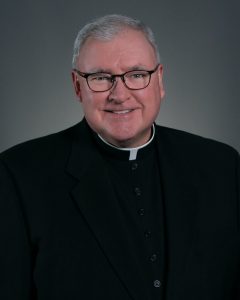The Archdiocese of Philadelphia rejoices to have 11 of her own priests appointed to be Archdiocesan Missionaries of Mercy. These priests are available to help facilitate pastoral initiatives that focus on conversion and divine mercy, with a particular attention given to the Sacrament of Reconciliation.
>>SEE RELATED: Archbishop Nelson J. Pérez Commissions Ten New Missionaries of Mercy
Missionaries of Mercy are priests – diocesan or religious – who have been commissioned by the Holy Father to give particular emphasis to the duty shared by all priests to “hear confessions and preach on behalf of and promote the Sacrament of Reconciliation.” They are to be an intentional, visible expression of the mercy of God, which is at the heart of the priesthood and all of Catholic life. In addition, Missionaries of Mercy have the authority, granted by the Holy Father, to pardon these sins reserved to the Holy See:
- Profaning the Eucharistic species by taking them away or keeping them for a sacrilegious purpose;
- Use of physical force against the Roman Pontiff;
- Absolution of an accomplice in a sin against the Sixth Commandment of the Decalogue;
- A direct violation against the sacramental seal by a confessor.
- The recording by means of a technical device of what the priest or the penitent says in a Sacramental Confession (whether real or simulated), or the divulgation of such a recording through the means of social communication.
CatholicPhilly presents the following interview with Monsignor Joseph P. Duncan, Pastor of Saint Patrick Parish in Malvern (Chester County). Read our additional profiles on the new Missionaries of Mercy here.
***

Monsignor Joseph P. Duncan
Q: In what ways do you plan to integrate this special aspect of your priesthood into your daily activities and ministries?
The Sacrament of Reconciliation is an integral part of the life and ministry of every priest. The Missionaries of Mercy are to minister through the Sacrament of Reconciliation with great zeal. The opportunity to share in this role has increased my appreciation for the sacred encounter which occurs within the confessional. It is extremely humbling to act in the person of Jesus Christ within the Sacrament of Reconciliation. I find myself preaching on the Sacrament of Reconciliation when the Scriptural readings are geared particularly to repentance and healing. Also, here at Saint Patrick Parish in Malvern, we schedule additional opportunities for people to come to Confession.
Q: How to do you plan to carry out this work beyond your current assignment?
The priests within our [Episcopal] Region assist each other frequently with confessions at other parishes. I assist other parishes with confessions as often as my schedule permits.
Q: In what ways can lay individuals live out the message of mercy in their everyday lives?
Everyone is called to practice the Corporal and Spiritual Works of Mercy, especially in our troubled world. To be witnesses of the Mercy of Christ is essential for the life of the Christian. A particularly powerful witness to the Mercy of God, although seemingly so simple, is when parents go to confession regularly, and when they bring their children for confession. Such exemplary behavior helps to engrain in young people a deep appreciation and love for this sacrament, which indeed is an added safeguard against the sinful climate of today’s world. This was an example set by my parents when I was growing up. On the first Saturday of the month, no matter where we were or what we were doing, my brother and I had to meet our parents on the corner of our street and we would walk 2 blocks to the Church to go to confession. I never forgot that respect and love for the sacrament instilled in me by my mother and father.
Q: The Sacrament of Reconciliation communicates God’s infinite mercy to us. What would you say to those who have been away from confession and may be looking to make it a regular part of their faith journey again?
I always extend a “welcome back” to those who have been away from confession for a long time. I tell them not to be afraid. I also use the example of carrying very heavy luggage uphill for a long period of time. The more our sins accumulate, the longer we bear the weight of our sins, life can become unbearable. I explain some example of the relief, the overwhelming feeling of joy which people experience once they confess their sins after a long time.
Q: What is your ultimate hope for your mission as an ambassador of mercy?
As a Missionary of Mercy, an Ambassador for Christ, I hope to be an instrument through which many will return to the Church, return to the practice of the Faith, return to the sacramental life which Jesus offers us through the ministry of His Priests.
***
To learn more about the Missionaries of Mercy International, please visit http://missionariesofmercyusa.org/. To learn more about the Missionaries of Mercy in the Archdiocese of Philadelphia, https://archphila.org/mercy/.
PREVIOUS: Missionaries of Mercy: A Q&A with Msgr. Paul V. Dougherty
NEXT: Missionaries of Mercy: A Q&A with Rev. Douglas M. McKay


Share this story